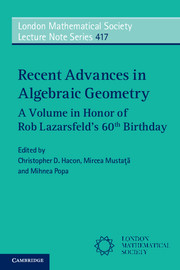Book contents
- Frontmatter
- Contents
- List of contributors
- Preface
- 1 The effect of points fattening in dimension three
- 2 Some remarks on surface moduli and determinants
- 3 Valuation spaces and multiplier ideals on singular varieties
- 4 Line arrangements modeling curves of high degree: Equations, syzygies, and secants
- 5 Rationally connected manifolds and semipositivity of the Ricci curvature
- 6 Subcanonical graded rings which are not Cohen–Macaulay
- 7 Threefold divisorial contractions to singularities of cE type
- 8 Special prime Fano fourfolds of degree 10 and index 2
- 9 Configuration spaces of complex and real spheres
- 10 Twenty points in ℙ3
- 11 The Betti table of a high-degree curve is asymptotically pure
- 12 Partial positivity: Geometry and cohomology of q-ample line bundles
- 13 Generic vanishing fails for singular varieties and in characteristic p > 0
- 14 Deformations of elliptic Calabi–Yau manifolds
- 15 Derived equivalence and non-vanishing loci II
- 16 The automorphism groups of Enriques surfaces covered by symmetric quartic surfaces
- 17 Lower-order asymptotics for Szegö and Toeplitz kernels under Hamiltonian circle actions
- 18 Gaussian maps and generic vanishing I: Subvarieties of abelian varieties
- 19 Torsion points on cohomology support loci: From D-modules to Simpson's theorem
- 20 Rational equivalence of 0-cycles on K3 surfaces and conjectures of Huybrechts and O'Grady
- References
15 - Derived equivalence and non-vanishing loci II
Published online by Cambridge University Press: 05 January 2015
- Frontmatter
- Contents
- List of contributors
- Preface
- 1 The effect of points fattening in dimension three
- 2 Some remarks on surface moduli and determinants
- 3 Valuation spaces and multiplier ideals on singular varieties
- 4 Line arrangements modeling curves of high degree: Equations, syzygies, and secants
- 5 Rationally connected manifolds and semipositivity of the Ricci curvature
- 6 Subcanonical graded rings which are not Cohen–Macaulay
- 7 Threefold divisorial contractions to singularities of cE type
- 8 Special prime Fano fourfolds of degree 10 and index 2
- 9 Configuration spaces of complex and real spheres
- 10 Twenty points in ℙ3
- 11 The Betti table of a high-degree curve is asymptotically pure
- 12 Partial positivity: Geometry and cohomology of q-ample line bundles
- 13 Generic vanishing fails for singular varieties and in characteristic p > 0
- 14 Deformations of elliptic Calabi–Yau manifolds
- 15 Derived equivalence and non-vanishing loci II
- 16 The automorphism groups of Enriques surfaces covered by symmetric quartic surfaces
- 17 Lower-order asymptotics for Szegö and Toeplitz kernels under Hamiltonian circle actions
- 18 Gaussian maps and generic vanishing I: Subvarieties of abelian varieties
- 19 Torsion points on cohomology support loci: From D-modules to Simpson's theorem
- 20 Rational equivalence of 0-cycles on K3 surfaces and conjectures of Huybrechts and O'Grady
- References
Summary
Abstract
We prove a few cases of a conjecture on the invariance of cohomological support loci under derived equivalence by establishing a concrete connection with the related problem of the invariance of Hodge numbers. We use the main case in order to study the derived behavior of fibrations over curves.
Dedicated to Rob Lazarsfeld on the occasion of his 60th birthday, with warmth and gratitude
1 Introduction
This paper is concerned with the following conjecture made in [11] on the behavior of the non-vanishing loci for the cohomology of deformations of the canonical bundle under derived equivalence. We recall that given a smooth projective X these loci, more commonly called cohomological support loci, are the closed algebraic subsets of the Picard variety defined as
Vi(ωX) := {α | Hi(X, ωX ⊗ α) ≠ 0} ⊆ Pic0(X).
All varieties we consider are defined over the complex numbers. We denote by D(X) the bounded derived category of coherent sheaves Db(Coh(X)).
Conjecture 1 ([11]) Let X and Y be smooth projective varieties with D(X) ≃ D(Y) as triangulated categories. Then
Vi(ωX)0 ≃ Vi(ωY)0 for all i ≥ 0,
where Vi(ωX)0 denotes the union of the irreducible components of Vi(ωX) passing through the origin, and similarly for Y.
We refer to [10] and [11] for a general discussion of this conjecture and its applications, and of the cases in which it has been known to hold (recovered below as well). The main point of this paper is to relate Conjecture 1 directly to part of the well-known problem of the invariance of Hodge numbers under derived equivalence; we state only the special case we need.
Conjecture 2Let X and Y be smooth projective varieties withD(X) ≃ D(Y).
Then
h0,i(X) = h0,i(Y) for all i ≥ 0.
Our main result is the following:
Theorem 3Conjecture 2 implies Conjecture 1. More precisely, Conjecture 1 for a given i is implied by Conjecture 2 for n − i, where n = dim X.
- Type
- Chapter
- Information
- Recent Advances in Algebraic GeometryA Volume in Honor of Rob Lazarsfeld’s 60th Birthday, pp. 291 - 306Publisher: Cambridge University PressPrint publication year: 2015
References
- 3
- Cited by



